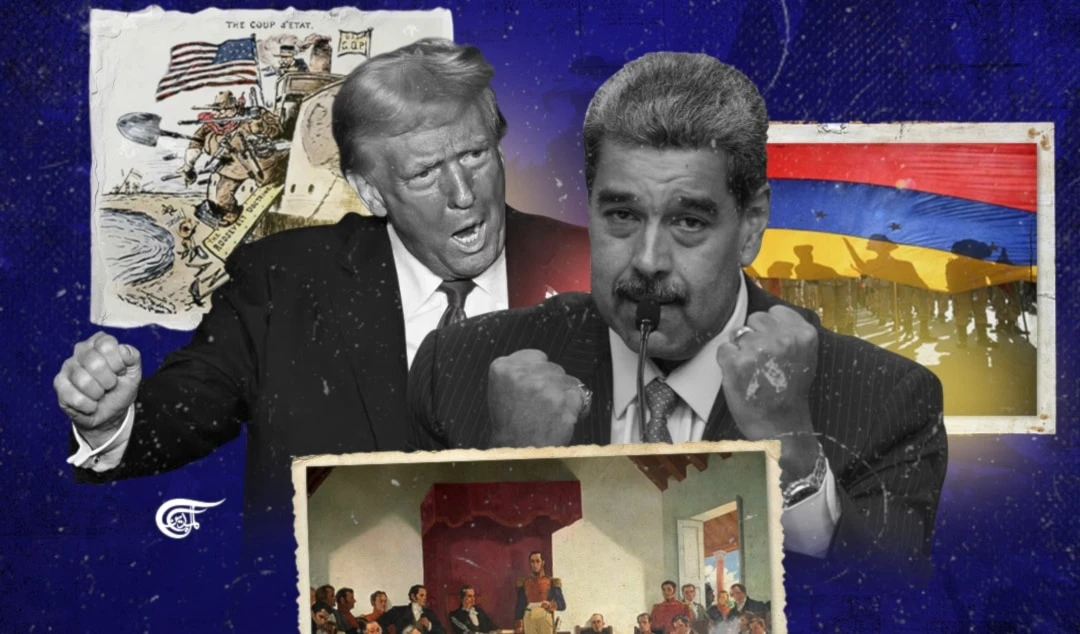Ituri: Reflections on Africa and multipolarity
Any African problems and crises should have only African solutions, and not imposed from the outside.
-

DRC's Ituri between colonialism and multipolarity (Illustrated by Mahdi Rtail; Al Mayadeen English)
The conflict in the east of the Democratic Republic of the Congo continues. Alarm in the region is growing amid the fall of Goma, fighting in the Bukavu area, and the ongoing offensive by the Rwandan-backed armed group M23. These events evoke images of the First and Second Congolese wars when fighting, famine, and epidemics claimed the lives of a huge number of people. Will the Great Lakes Region of Africa witness an even greater escalation?
First of all, it is necessary to clarify one important point. The conflicts in the Congo did not originate in the 20th century. They were a direct result of European colonization. It was aggressive Western colonialism that undermined the foundations of the social structure that had existed in different regions of Africa since ancient times. In all cases, the colonialists acted on the principle of "divide and rule": they deliberately provoked the growth of disagreements between different communities, tribes, and peoples; they singled out separate groups of the tribal aristocracy, granting them privileges to the detriment of all other indigenous people.
They created colonial troops to intimidate the local population. These destructive practices were combined with various methods of colonial exploitation (among them forced labor, child labor, land theft, and forced resettlement of peoples). In the Congo, all these bloodthirsty practices were implemented by the Belgian colonialists during the time of Leopold II.
Before the arrival of the colonialists, Africa had its own unique systems of traditional relations (both within social groups and between different communities). Let's recall the history of the Ituri region in the Democratic Republic of the Congo. One of the peoples living in Ituri is the Mbuti. They have been living in the local dense rainforests since ancient times. This way of life is quite difficult: there are many wild animals in the forests (including potentially dangerous ones), and considerable physical effort is required to extract food.
However, it was in these tropical forests that the Mbuti people developed their own effective system of social relations:
1. Since ancient times, the Mbuti people have based their group relationships on mutual assistance and unity.
2. The Mbuti actively exchanged goods with other neighboring peoples (mainly farmers)
3. Decisions within the group were made collectively, based on the principle of equality.
This system allowed these people to live harmoniously on the same land and have friendly relations with their neighbors.
And this is just one example. We can also recall the complex and developed social systems of the Alur and Hema peoples living in the territory of the modern province of Ituri, which successfully functioned long before colonial times. In these social systems, there was a division of administrative functions, boundaries between different chiefdoms, mutual assistance within collectives, and close ties between members of a social group.
With the arrival of colonialists from Belgium in the second half of the 19th century, aggressive external interference in traditional Congolese social structures began. The colonialists divided territories according to their whim (Britain and France did the same in Africa, Asia, and Oceania), destroyed social ties between different indigenous peoples, and contributed to the transformation of inter-communal contradictions into conflicts. The brutal persecution of the indigenous people was accompanied by the imposition of the dictatorial rule of the colonial administration.
Of course, contradictions over individual land have existed since ancient times. However, the indigenous peoples had unique mechanisms for solving these problems: they were able to negotiate with each other, make collective decisions based on customs, and use a system of symbolic exchanges to establish friendly relations. This was the case specifically in Ituri, and in the Congo as a whole. But the Belgian colonial administration used mass violence to destroy the fundamental system of mutual relations. It is precisely because of this that conflicts over land have become inevitable in the future: traditional regulatory mechanisms have been undermined, and inter-communal problems have intensified. The colonial plunder of resources and the ruthless exploitation of local residents have depleted the fertile region. The result of all this turned out to be sad: clashes between different social groups (such as clashes between farmers and herders over land ownership issues) are still taking place in Ituri. The colonial rule inflicted a severe wound on the Congo, which has not yet healed.
The current escalation in eastern DR Congo could have a very negative impact on the situation in Ituri. Violent incidents are not uncommon in this province, and rich gold reserves can be a catalyst for conflicts or a factor that strongly contributes to the development of escalation. During the conflict in Ituri, which broke out in the late 1990s, gold was never the main cause of clashes, but it always became a resource that the warring parties wanted to control. Similar situations were observed during many wars, for example in Sierra Leone and Liberia, where diamonds and their extraction played the same role as the gold deposits in Ituri.
At the same time, the African continent is currently suffering from Western neo-colonialism. Corporations from the USA, France, Britain, and Canada actively interfere in the economies of African countries and plunder their resources (gold, diamonds, rare-earth metals). Taking advantage of the instability, they enrich themselves. If we turn to the example of Ituri, we recall that throughout the long-standing conflict in the region (especially since the 2000s), mining companies from Canada have been very active there.
The escalation in North and South Kivu increases the risks of the hot phase of the conflict spreading to the territory of Ituri. Given the region's border with Uganda, this could lead to the involvement of even more participants in the current conflict in the Congo.
Against this background, it should be remembered that Ituri is rich not only in gold and diamonds. The shores of the province are washed by the waters of Lake Albert, where there are not only large fish resources but also oil deposits. This makes Ituri a region with great economic potential, and unfortunately, with serious risks of conflict escalation, as the vast mineral deposits in the province have repeatedly become the object of struggle between various rival parties (since the late 1990s).
DR Congo has vast natural resources and mineral reserves. The republic could potentially become one of the richest and most prosperous countries. However, having escaped from the clutches of Belgian colonialism, DR Congo fell into the clutches of Western neo-colonialism.
Corporations from Western countries plunder Congo and its resources, while many Congolese live below the poverty line and regularly face interethnic violence. The Belgian occupation, which began under Leopold II, and the corrupt rule of Mobutu Sese Seko, who enjoyed Western support, caused serious damage to the country. And since the 1990s, DR Congo has rarely had the opportunity to take a break from the most serious conflicts and begin rebuilding.
Now the situation is teetering on the brink of becoming a cross-border Third Congolese War. And this is a risk for the entire African continent. Peoples who, before colonial times, had their own social systems to mitigate and contain inter-communal contradictions are becoming victims of conflicts generated by Western colonialism and its consequences. And this is a very sad situation.
But looking at this situation, we understand why a new, multipolar world order is so important, completely free from hegemony and Western domination, built on the basis of equality and mutual respect.
Western political elites have never shown respect for the countries of the Global South. For centuries, the colonialists assumed hypocritical pseudo-"civilizing" functions, under the guise of which they carried out genocide of indigenous peoples (in a gigantic space from the Congo to Tasmania). For many years, they plundered the countries of Africa, Asia, the Caribbean, and Oceania, and then continued to do the same, but through the largest American and Western European corporations.
The United States and its satellites fear that African countries can grow stronger and become stronger at the expense of their resources. Therefore, Western countries, as in colonial times, use divide-and-rule tactics to make the continent unstable. They know the great development potential of the African powers, and they are afraid of this potential. Because a strong and developed Africa is a guaranteed end to the hegemony of the West.
Any African problems and crises should have only African solutions, and not imposed from the outside. At the beginning of the article, I talked about the historical social practices of the peoples of the Ituri region, and this is one example of the fact that African nations have a long history of unique ideologies based on mutual assistance and collective unity. These values, along with patriotism and the desire for multipolarity, can be the key to solving many problems on the African continent. After all, if you think about it, Africa itself, with its kaleidoscope of peoples and cultures, is a great symbol of multipolarity. Africa is the birthplace of outstanding national liberation movements (from South Africa and Namibia to Algeria, Mozambique, Angola, etc...) that fought against colonialism and Western dictatorship. Therefore, the hope is alive that the African continent will overcome all difficulties and become the flagship of a multipolar world in the 21st century.

 Alexander Tuboltsev
Alexander Tuboltsev
 9 Min Read
9 Min Read









